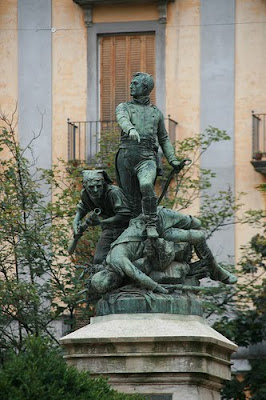Surrender of Gerona (december 10, 1809)
 The Third Siege of Gerona of May 6, 1809, after two more attempts in 1808, involved the French army's seven-month struggle to conquer the Spanish garrison at Girona. The town held out obstinately under the leadership of General Alvarez de Castro until disease and famine compelled it to capitulate on December 10.
The Third Siege of Gerona of May 6, 1809, after two more attempts in 1808, involved the French army's seven-month struggle to conquer the Spanish garrison at Girona. The town held out obstinately under the leadership of General Alvarez de Castro until disease and famine compelled it to capitulate on December 10.
On the accession of Joseph Bonaparte to the throne of Spain in 1808, General Alvarez de Castro was commander of the castle of Montjuïc in Barcelona. On February 29 French troops arrived to take possession of the fortress. Alvarez de Castro was preparing to defend it against them when he received direct orders of his Commander-in-Chief to hand it over. Alvarez de Castro fled Barcelona and joined the Spanish rebels against French rule. The Spanish Government in Cadiz named him commander of the Army of Catalonia and Governor of Gerona. On May 6 a French army of 18,000 men under the Marshal Augereau besieged the town. Alvarez de Castro had only 5,600 men under arms. The French mounted 40 gun batteries that over the next seven months fired some 20,000 explosive shells and 60,000 cannon balls into the city. In August, the French captured the castle of Montjuich, the main defensive point. Undeterred, Alvarez de Castro constructed barricades and trenches inside the city and battle raged for another four months before the Spanish general, exhausted and ill, handed over command to a subordinate.
On May 6 a French army of 18,000 men under the Marshal Augereau besieged the town. Alvarez de Castro had only 5,600 men under arms. The French mounted 40 gun batteries that over the next seven months fired some 20,000 explosive shells and 60,000 cannon balls into the city. In August, the French captured the castle of Montjuich, the main defensive point. Undeterred, Alvarez de Castro constructed barricades and trenches inside the city and battle raged for another four months before the Spanish general, exhausted and ill, handed over command to a subordinate.
Two days later, on 10 December, the town capitulated. It is estimated that some 10,000 people, soldiers and civilians, had died inside. French losses were around 15,000, over half of those to disease. Alvarez de Castro recovered from his illness, and was taken as a prisoner to Narbonne. Napoleon then decided that he should be tried as a traitor against King Joseph, and returned to Figueras, dying in a cellar on the day after his arrival in unclear circunstances. The town's resistance (rivalled only by the defenders of Saragossa) served Spanish purposes well owing to the large delays and losses imposed on the French, and the siege became something of a legend over the course of the Peninsular War.
The town's resistance (rivalled only by the defenders of Saragossa) served Spanish purposes well owing to the large delays and losses imposed on the French, and the siege became something of a legend over the course of the Peninsular War.


































No comments:
Post a Comment